Mind Games at the Department of Health
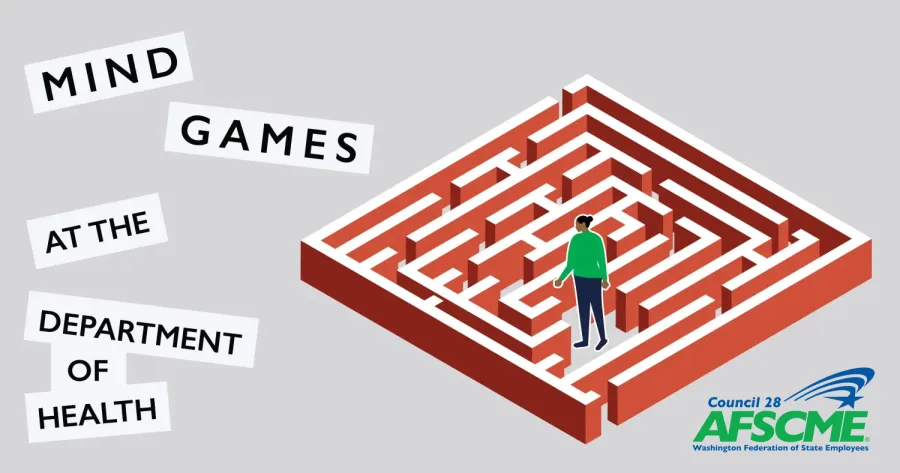
Update 12/20/25:
For years, millions of taxpayer dollars were spent on faith-based “empathy training” at the Department of Health that silenced discrimination concerns and penalized protected union activity.
That program, called Outward Mindset, is no more thanks to years of activism from our members at DOH.
Hundreds of WFSE members signed petitions, spoke to the media, and raised objections to the program any time the agency sought input. WFSE Local 443 and WFSE's Executive Board passed resolutions objecting to the training.

"With a new secretary of health, we saw an opportunity fora fresh start and mobilized a big push," said Mïlo Nicholas, a WFSE Executive Board member and steward at DOH. "At every listening session members brought it up. And after hearing from dozens and dozens of us, leadership caved.
"We will be saving our agency a lot of money in addition to protecting the mental health of our workers at DOH. It's a reminder that some systemic changes take time and continued pressure through lots of channels. Had we stopped pushing, I don't think we would have won."
Millions of taxpayer dollars have been spent on faith-based “empathy training” that silences discrimination concerns and penalizes protected union activity. Over 200 DOH employees have signed a petition calling for it to stop. Sign their petition here.
Media Coverage
State employees should be able to do their work without adhering to any religious creed. They should be able to look at their union contract, which is legally binding and signed by their employer, to learn how their work performance will be evaluated. They should be able to engage in federally protected union activity, such as raising concerns about wages and workplace conditions, without facing intimidation or discipline.
None of these are the case at the Washington State Department of Health (DOH).
Since 2019, DOH has paid over $2.5 million in taxpayer dollars for Outward Mindset training from the Arbinger Institute, an organization with roots in racist, homophobic, and religious ideology.
Arbinger leaders publicly express extreme views on reproductive, civil, worker, and equal rights, while the organization has been affiliated with alarming programs diametrically opposed to the Pro-Equity Anti-Racist (PEAR) values of Washington State and Governor Inslee’s Administration.

The curriculum of Outward Mindset is designed to turn victimizers into the victim, abusers into the abused. A core tenet of Outward Mindset is “self-deception,” the idea that when we feel attacked by another person, we are simply deceiving ourselves.
Here’s a quote from the Arbinger Institute’s white paper on the subject: “When we have a problem with another person, the chances are that our seeing that person as the problem is the problem.”
Now that’s an ideology management can get behind, especially when it's facing increasing union activism!
Outward Mindset has become DOH’s standard for conduct. It is used to determine who is hired, fired, promoted or disciplined. It is also being used to discourage Equal Employment Opportunity (EEO) complaints relating to issues like diversity, equity and inclusion.
One DOH employee, who chose to remain anonymous for fear of retaliation, said that the program “discourages the very behaviors that have become the standards for healthy modern workplaces, and it actually makes those behaviors targets for discipline or retaliation.”
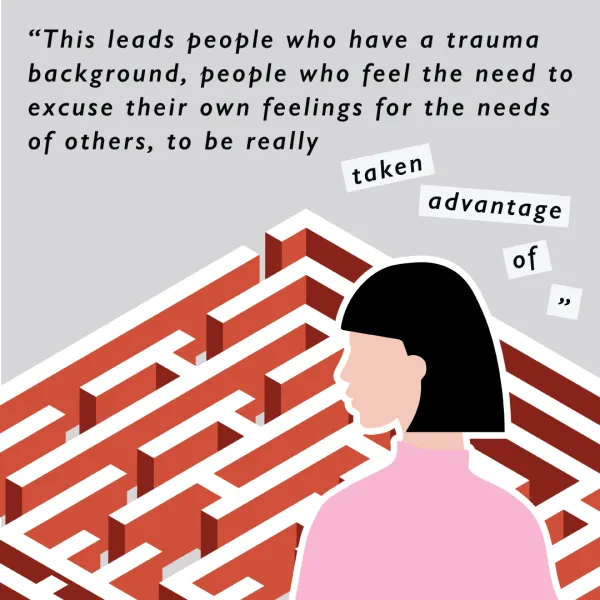
Rachelle Martin is a WFSE union steward who helps run DOH’s Behavioral Risk Factor
Surveillance System. She collects information on various things, such as Washingtonian’s tobacco use, ability to see a doctor, etc.
As a steward, Rachelle is responsible for ensuring our union contract is being followed in the workplace, Rachelle spends a lot of her steward-related time dealing with the impacts of Outward Mindset.
“Management can mistreat us, but we can’t respond,” she said. “So people push down their own feelings. This leads people who have a trauma background, people who feel the need to excuse their own feelings for the needs of others, to be taken advantage of.”
According to Outward Mindset, even talking to a coworker is seen as a violation. During DOH’s “listening sessions,” management responds to comments or questions about pay and working conditions with, “You should really consider how your words impacted us.”
“People feel like they are always in trouble,” Rachelle said. “People wonder, ‘Did I do something wrong?’ but they can’t talk to a coworker about it because that is considered collusion.”
Many DOH employees will only speak out on the condition of anonymity.
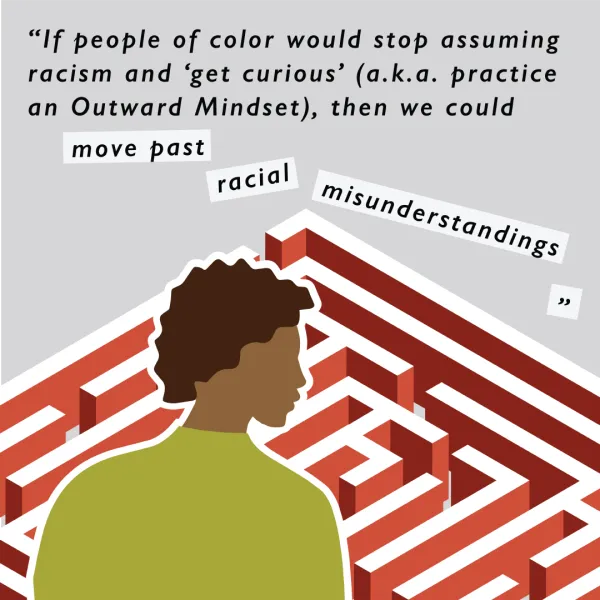
A supervisor at DOH who chose to remain anonymous said, “I am very uncomfortable using it with my team. During the training, the first thing my Arbinger trainer said was, ‘If you take one thing away from this training, it should be understanding this: all of the problems at Washington DOH start with YOU.’”
The trainer then said that it was harmful for employees of color to assume that verbal and behavioral slights were rooted in racism, and that perceiving these actions as racist was “inward thinking.”
“He shared that if people of color would stop assuming racism and ‘get curious’ (a.k.a. practice an Outward Mindset), then we could move past racial misunderstandings in the workplace,” the supervisor said. “As a supervisor and a person of color, this was incredibly alarming. Since I started at the agency, I’ve heard endless stories of other staff of color feeling the same way or having their own supervisors weaponize Outward Mindset against them when voicing their concerns.”
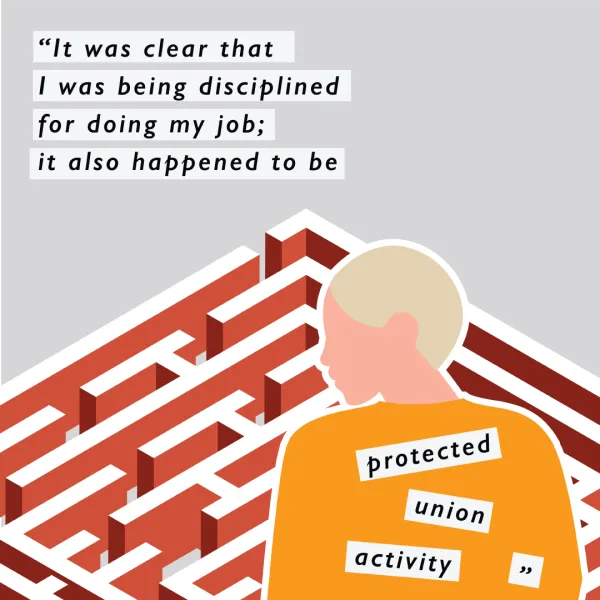
Workers have described the program as being used to discourage subordinates from pushing back against unreasonable assignments or requests or even asking questions for clarity.
Aylis Lind got into public service to help reduce hunger and poverty in our communities and “leave our world better than we found it.” After a long career at the Department of Social and Health Services (DSHS), they transferred to DOH as a management analyst in October 2022 where they helped the agency with projects to procure equipment, manage records, and set a framework for equitable collaboration.
In the process of their work, Aylis learned that one of their coworkers was not being paid at the proper rate. “This was part of my job,” Aylis said, “tracking processes and suggesting improvements. But this made management uncomfortable. Because Outward Mindset is all about impact regardless of right or wrong, it was something that I could be disciplined for.”
When Aylis was told that they were being denied permanency and that the issue could be put on their permanent record, they quit and reverted back to their position at DSHS.
“It was clear that I was being disciplined for doing my job; it also happened to be a protected union activity,” Aylis said. “I remember telling my coworkers on a few occasions that this is not normal. This is not how state offices are run.”
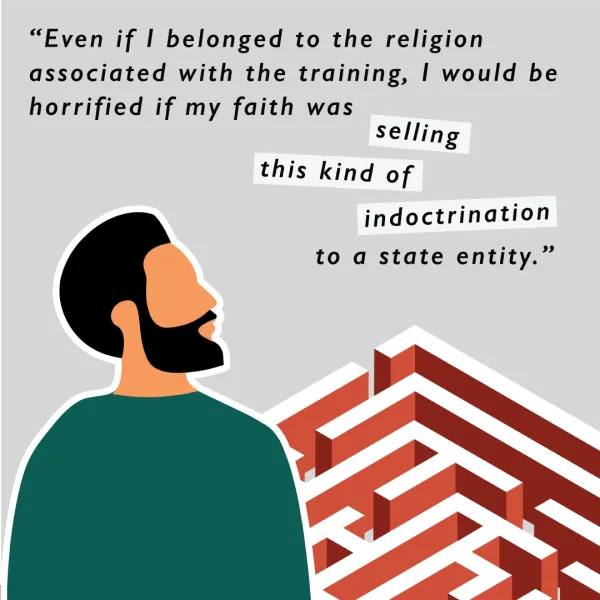
An accomplished epidemiologist (who has decided to remain anonymous) interviewed for
three different epidemiologist positions at DOH. He was offered his choice of which job he wanted. There was good reason for DOH to be excited; after 30 years of experience in his field publishing manuscripts in peer-reviewed journals and designing global health studies, he had finally decided to get involved in state service.
“I’ve always felt that protecting public health is one of the core responsibilities of government,” he said. “When the COVID-19 pandemic started, I felt I needed to get involved.”
He joined DOH in October 2021 and was thrown into the state’s COVID response, helping to answer critical questions like: Where do we need ventilators? Where do we need hospital beds? Where do we feel we need people performing essential duties?
After doing some initial research on Outward Mindset once he learned it was required, he was shocked to find that the “institute” was not affiliated with any university but was religiously affiliated. “Even if I belonged to the religion associated with the training, I would be horrified if my faith was selling this kind of indoctrination to a state entity.
He brought up his concerns with his supervisor, and shortly thereafter was told that his services were no longer needed.
Another DOH supervisor who chose to share his concerns anonymously shared, “My employees, who are people of color, queer and/or disabled, feel very uncomfortable with Outward Mindset overall. Then to find out it’s clearly based in a religious sect makes them feel angry that they were forced to do it as an employee.”
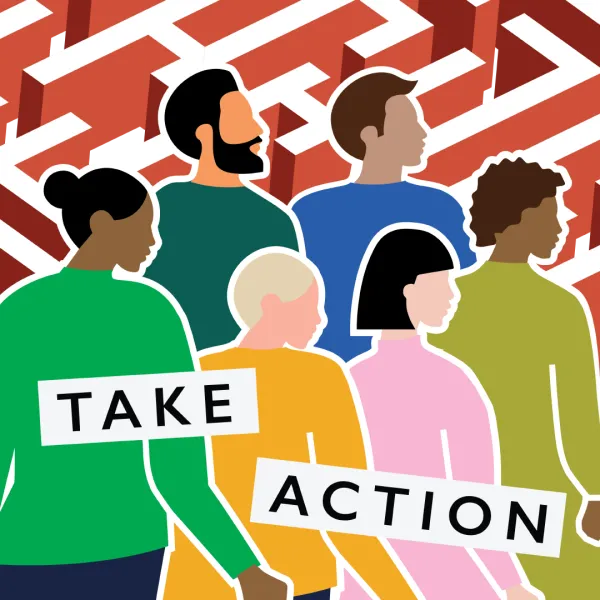
It’s time to take a stand. Despite repeated concerns raised by DOH staff and our union, DOH continues to cause real harm to its workers through the use of Outward Mindset. It’s a serious equity issue, a legal issue, as well as a recruitment and retention issue.
Join DOH union activists in calling on the Inslee Administration to end the use of Outward Mindset in state government and end all dealings with the Arbinger Institute.
